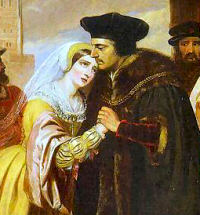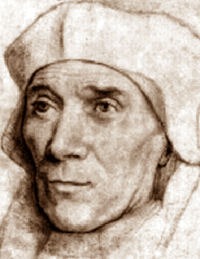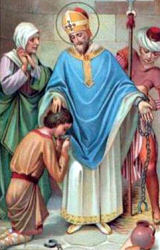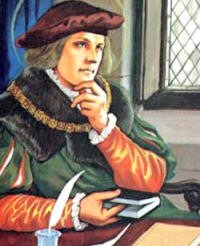Daily Readings for: June 22, 2012
(Readings on USCCB website)
Collect: O God who the Bishop Saint Paulinus of Nola outstanding for love of poverty and for pastoral care, graciously grant that, as we celebrate his merits, we may imitate the example of his charity. Through our Lord Jesus Christ, your Son, who lives and reigns with you in the unity of the Holy Spirit, one God, for ever and ever.
O God, who in martyrdom have brought true faith to its highest expression, graciously grant that, strengthened through the intercession of Saints John Fisher and Thomas More, we may confirm by the witness of our life the faith we profess with our lips. Through our Lord Jesus Christ, your Son, who lives and reigns with you in the unity of the Holy Spirit, one God, for ever and ever.
RECIPES
ACTIVITIES
PRAYERS
Ordinary Time: June 22nd
Optional Memorial of St. Paulinus of Nola, bishop and confessor; Optional Memorial of Sts. John Fisher, bishop and martyr and Thomas More, martyr
Old Calendar: St John Fisher; St. Paulinus; St. Alban
St. Thomas More was born in London, England and was Chancellor of King Henry VIII. As a family man and a public servant, his life was a rare synthesis of human sensitivity and Christian wisdom.
St. John Fisher studied Theology in Cambridge (England) and became Bishop of Rochester. His friend, Thomas More, wrote of him, 'I reckon in this realm no one man, in wisdom, learning and long approved virtue together, meet to be matched and compared with him.' He and his friend St. Thomas More gave up their lives in testimony to the unity of the Church and to the indissolubility of Marriage.
St. Paulinus was born of a patrician Roman family at Bordeaux. He was successively prefect, senator and consul. His wife, wishing to consecrate herself to God, gave up rank and riches; he followed her example and went to live an austere hermit's life at Nola in Italy. There he became a priest and then bishop of the city, and gave his people not only an example of virtue but also wise guidance during the ravages and calamities of the Gothic invasion. He died in 431, aged 78, and was buried at Nola near the tomb of St. Felix.
According to the 1962 Missal of Bl. John XXIII the Extraordinary Form of the Roman Rite, today is the feast of St. Alban who was venerated as the proto-martyr of Britain. He was a citizen of Verulam and was converted by a persecuted priest whom he sheltered in his house. He was executed on Holmhurst Hill. On that spot King Offa erected the Benedictine abbey of St. Alban's by which name Verulam has since been known.
The feast of Corpus Christi is celebrated today in the Extraordinary Form since it is the Thursday after Trinity Sunday.
St. Thomas More
 His belief that no lay ruler has jurisdiction over the church of Christ cost Thomas More his life.
His belief that no lay ruler has jurisdiction over the church of Christ cost Thomas More his life.
Beheaded on Tower Hill, London, July 6, 1535, he steadfastly refused to approve Henry VIII's divorce and remarriage and establishment of the Church of England.
Described as "a man for all seasons," More was a literary scholar, eminent lawyer, gentleman, father of four children and chancellor of England. An intensely spiritual man, he would not support the king's divorce from Catherine of Aragon in order to marry Anne Boleyn. Nor would he acknowledge Henry as supreme head of the church in England, breaking with Rome and denying the pope as head.
More was committed to the Tower of London to await trial for treason: not swearing to the Act of Succession and the Oath of Supremacy. Upon conviction, More declared he had all the councils of Christendom and not just the council of one realm to support him in the decision of his conscience.
Four hundred years later, in 1935, Thomas More was canonized a saint of God. Few saints are more relevant to our time. In fact, in 2000, Pope John Paul II named him patron of political leaders. The supreme diplomat and counselor, Thomas More did not compromise his own moral values in order to please the king, knowing that true allegiance to authority is not blind acceptance of everything that authority wants. Henry himself realized this and tried desperately to win his chancellor to his side because he knew More was a man whose approval counted, a man whose personal integrity no one questioned. But when Thomas resigned as chancellor, unable to approve the two matters that meant most to Henry, the king felt he had to get rid of Thomas.
Excerpted from Saint of the Day, Leonard Foley, O.F.M.
Patron: Adopted children; diocese of Arlington, Virginia; civil servants; court clerks; difficult marriages; large families; lawyers; diocese of Pensacola-Tallahassee Florida; politicians; politicos; statesmen; step-parents; widowers.
Things to Do:
St. John Fisher
 John Fisher is usually associated with Erasmus, Thomas More and other Renaissance humanists. His life, therefore, did not have the external simplicity found in the lives of some saints. Rather, he was a man of learning, associated with the intellectuals and political leaders of his day. He was interested in the contemporary culture and eventually became chancellor at Cambridge. He had been made a bishop at thirty-five, and one of his interests was raising the standard of preaching in England. Fisher himself was an accomplished preacher and writer. His sermons on the penitential psalms were reprinted seven times before his death. With the coming of Lutheranism, he was drawn into controversy. His eight books against heresy gave him a leading position among European theologians.
John Fisher is usually associated with Erasmus, Thomas More and other Renaissance humanists. His life, therefore, did not have the external simplicity found in the lives of some saints. Rather, he was a man of learning, associated with the intellectuals and political leaders of his day. He was interested in the contemporary culture and eventually became chancellor at Cambridge. He had been made a bishop at thirty-five, and one of his interests was raising the standard of preaching in England. Fisher himself was an accomplished preacher and writer. His sermons on the penitential psalms were reprinted seven times before his death. With the coming of Lutheranism, he was drawn into controversy. His eight books against heresy gave him a leading position among European theologians.
In 1521 he was asked to study the problem of Henry VIII's marriage. He incurred Henry's anger by defending the validity of the king's marriage with Catherine and later by rejecting Henry's claim to be the supreme head of the Church of England.
In an attempt to be rid of him, Henry first had him accused of not reporting all the "revelations" of the nun of Kent, Elizabeth Barton. John was summoned, in feeble health, to take the oath to the new Act of Succession. He and Thomas More refused because the Act presumed the legality of Henry's divorce and his claim to be head of the English church. They were sent to the Tower of London, where Fisher remained fourteen months without trial. They were finally sentenced to life imprisonment and loss of goods.
When the two were called to further interrogations, they remained silent. Fisher was tricked, on the supposition he was speaking privately as a priest, and declared again that the king was not supreme head. The king, further angered that the pope had made John Fisher a cardinal, had him brought to trial on the charge of high treason. He was condemned and executed, his body left to lie all day on the scaffold and his head hung on London Bridge. More was executed two weeks later.
Excerpted from Saint of the Day, Leonard Foley, O.F.M.
Patron: Those persecuted for the Faith.
Symbols: Palm
Things to Do:
St. Paulinus
 In 353 Pontius Meropius Anicius Paulinus was born of a prominent Bordeaux family. He received his education in the school of the rhetorician Ausonius. At an early age he attained the dignity of senator and then of consul. As governor of Campania, he chose Nola as his seat. Here he was converted to the faith by St. Felix of Nola. He resigned his position and returned to Gaul, where St. Martin of Tours restored his eyesight.
In 353 Pontius Meropius Anicius Paulinus was born of a prominent Bordeaux family. He received his education in the school of the rhetorician Ausonius. At an early age he attained the dignity of senator and then of consul. As governor of Campania, he chose Nola as his seat. Here he was converted to the faith by St. Felix of Nola. He resigned his position and returned to Gaul, where St. Martin of Tours restored his eyesight.
Despite personal remonstrances, Paulinus was ordained a priest in Spain, and from there he returned to do honor at the grave of his sainted spiritual father. In 409 he became bishop of Tours. Paulinus was an author and poet; he corresponded with the great saints and scholars of his time, Ambrose and Augustine. During the Vandal invasion he used every possible means to feed the poor. When a poor widow asked for money to ransom her son, he gave himself into slavery. With God's aid he returned to his flock and died at the age of seventy-eight in 431. His last words were: "I will prepare a lamp for My anointed" (Ps. 131). His particular virtue was love toward the poor.
Excerpted from The Church's Year of Grace, Pius Parsch


 His belief that no lay ruler has jurisdiction over the church of Christ cost Thomas More his life.
His belief that no lay ruler has jurisdiction over the church of Christ cost Thomas More his life.  John Fisher is usually associated with Erasmus, Thomas More and other Renaissance humanists. His life, therefore, did not have the external simplicity found in the lives of some saints. Rather, he was a man of learning, associated with the intellectuals and political leaders of his day. He was interested in the contemporary culture and eventually became chancellor at Cambridge. He had been made a bishop at thirty-five, and one of his interests was raising the standard of preaching in England. Fisher himself was an accomplished preacher and writer. His sermons on the penitential psalms were reprinted seven times before his death. With the coming of Lutheranism, he was drawn into controversy. His eight books against heresy gave him a leading position among European theologians.
John Fisher is usually associated with Erasmus, Thomas More and other Renaissance humanists. His life, therefore, did not have the external simplicity found in the lives of some saints. Rather, he was a man of learning, associated with the intellectuals and political leaders of his day. He was interested in the contemporary culture and eventually became chancellor at Cambridge. He had been made a bishop at thirty-five, and one of his interests was raising the standard of preaching in England. Fisher himself was an accomplished preacher and writer. His sermons on the penitential psalms were reprinted seven times before his death. With the coming of Lutheranism, he was drawn into controversy. His eight books against heresy gave him a leading position among European theologians.  In 353 Pontius Meropius Anicius Paulinus was born of a prominent Bordeaux family. He received his education in the school of the rhetorician Ausonius. At an early age he attained the dignity of senator and then of consul. As governor of Campania, he chose Nola as his seat. Here he was converted to the faith by St. Felix of Nola. He resigned his position and returned to Gaul, where St. Martin of Tours restored his eyesight.
In 353 Pontius Meropius Anicius Paulinus was born of a prominent Bordeaux family. He received his education in the school of the rhetorician Ausonius. At an early age he attained the dignity of senator and then of consul. As governor of Campania, he chose Nola as his seat. Here he was converted to the faith by St. Felix of Nola. He resigned his position and returned to Gaul, where St. Martin of Tours restored his eyesight. 
